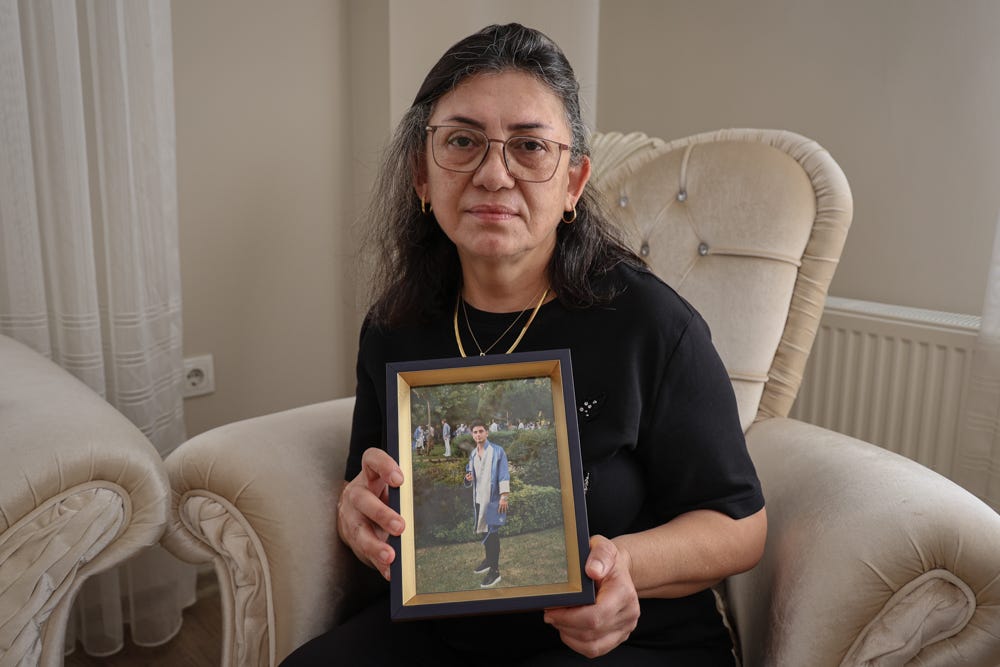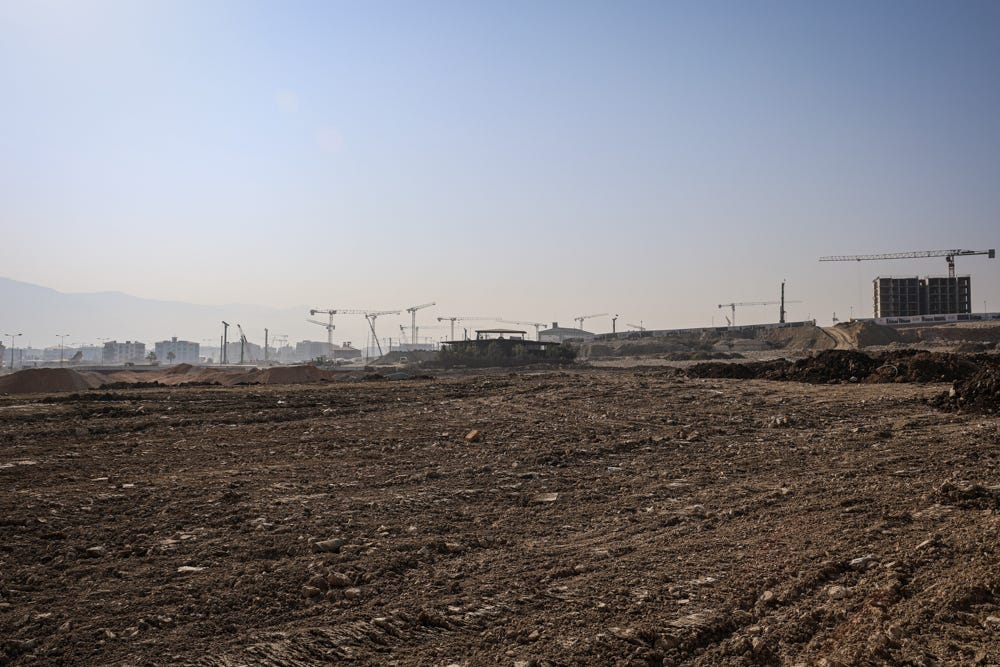
HATAY—Cemile İncili remembers being trapped after the first earthquake on Feb. 6, 2023. She also remembers hearing the voices of her sister, Mevlüde Yıldız İncili (60), and her nephew, Mehmet Şükrü İncili (39), in nearby rooms.
Rescue crews pulled her out of the rubble the next day, half conscious. They took her first to Adana and then to Ankara, where she spent a month and a half recovering.
She had survived the collapse of the Rönesans Rezidans, a luxury apartment in Antakya that turned sideways in the tremor. At least 269 people died in the building, and about 50 additional people were never found — including Cemile’s sister and nephew.
Now 59, Cemile thinks of them often. They both loved to travel and had been to Europe and America. Mevlüde was a teacher, “very idealistic, she loved children and was due to retire in three years,” she said.
Cemile is one of many people in Turkey who lost loved ones to the Feb. 6 earthquakes and don’t know what happened to them. As the disaster’s third anniversary approaches, the families of Turkey’s missing quake victims continue searching for clues on the whereabouts and remain unsettled by the lack of clear answers.
Cemile said she has felt unsupported by state authorities and recounted a face-to-face exchange she had with Hatay Gov. Mustafa Masatlı.
“He told me: ‘Cemile, it was a big earthquake. They went to heaven. It doesn’t matter if there is a grave. Wherever you [pray for them], it goes to their souls.’”
“‘I know,’ I said, ‘But I need a place to go. Is it my right to find out if they were burned, torn apart, killed, buried wrongly, or if someone took them away?’”

The total number of people missing from the Feb. 6 earthquakes varies depending on the source.
Three months after the disaster, then-Interior Min. Süleyman Soylu said 297 people, including 86 children, were missing. In November 2024, the current Interior Min. Ali Yerlikaya updated the missing to 75, including 30 children.
The same month, the Republican People’s Party (CHP) deputy for Hatay, Nermin Yıldırım Kara, said there were 140, including 38 minors.
There are several reasons for the disappearances. Among them are a lack of government assistance and supervision during initial rescue efforts, which led to false identifications. The condition of some bodies also made identification difficult.
“In the first few weeks, burials took place without time for DNA testing,” said Aysun Avcı, a lawyer from Adıyaman who has worked on cases involving missing people.
A report published on March 31, 2023, by the Association of Forensic Experts confirms the identification problems in the immediate aftermath of the earthquakes.
“Despite warnings from our expert colleagues for approximately two weeks, it was reported that prosecutors were handing over bodies to ‘relatives’ based on their statements, without taking any samples,” the report states.
The high number of deaths—more than 50,000—and the lack of space for bodies also made it difficult for forensic experts to put pressure on prosecutors at the time.
Another factor was the state of health care facilities. Some hospitals were further damaged by the second earthquake, leading to the evacuation of patients. In some cases, families were not informed of their relatives’ new location.
“We had a case of a father looking for his daughter. The girl had been transferred to a hospital in Ankara, but no one had notified the father. It was thanks to personal networks that we were able to locate the daughter,” explains the lawyer Aysun Avcı.
She also said that in some cases, bodies may have been unknowingly transferred to rubble dumps by clean up crews.
In other cases, such as that of Mustafa Batuhan Güleç (24), people survived the earthquakes but were lost track of during their transfer to hospital.
Sema Güleç, his mother, explains that neighbors saw her son after the earthquakes. He lived in the Gülerius Apartment building in Iskenderun. Those who rescued him took him out at 10 am and covered him with a blanket. He had no physical injuries.
Rescuers wanted to transport him by ambulance, but since there was no space he was taken in a private car instead. His family never heard from him again.

Batuhan studied architecture and loved sports, his mother said.
“He used to play all kinds of sports. From an early age, he played football, basketball and then taekwondo,” Sema told Turkey recap. “He was very helpful. He never upset us. He grew up on his own. He was a very good boy.”
Batuhan’s family waited eight days for the workers to finish removing all the rubble and searched for him throughout the country.
“We checked all the hospitals in Turkey. We checked the cemeteries. We checked the morgues. I reported his disappearance to the police,” Sema said. “It’s been over two years. I’ve been looking for him, but he’s not here.”
In the earthquake zone cemeteries, there are still unidentified graves marked with a piece of wood standing upright, as a headstone. Some have a number, others a piece of cloth.
There are also some with the words: ‘Ben kimsesiz değilim. DNA bekliyorum’ (I am not without an identity. I am waiting for DNA testing).
The families interviewed for this report have also been waiting for cross-referenced DNA tests to determine the identities of the deceased.
“No one cared about him properly for a year. They didn’t look for him. For example, we wanted the graves to be opened. After that, the DNA tests should be done again. However, no one cared for a year. If anyone cared, maybe he would be found,” Sema said.

Cemile’s experience has been similar.
“There is no result. This upsets us,” Cemile told Turkey recap. “If the DNA test comes out, I will go to the prosecutor. He will tell me: ‘If there is a match, we will let you know’. That’s it. How many times do we have to hear this promise? It’s always the same every time we go. We have no answers.”
Ayten Tuncer’s sister, Nesrin Tuncer (42), disappeared in Antakya. She lived in the same flat as her parents, but unlike them, her body was never found. She was a civil servant at the Ministry of Finance. She did not get married and she loved traveling abroad.
“She had no problems. She was full of life. She was a girl with no hatred. She never made us angry,” Ayten said. “What can I say? She was a good sister.”
Since Feb. 6, 2023, Nesrin’s family have also carried out DNA tests, but without a positive match.
“Technology has developed nowadays. It’s not like it used to be,” Ayten told Turkey recap. “People are going to space. I mean, why is it not possible to find the [lost people] under the ground? Are we that helpless?”

All interviewees said they have lost trust in the state’s capacity as a result of their experiences in searching for lost loved ones. The Interior Ministry did not respond to multiple interview requests for this report.
Such feelings are intensified by official statements, like the one made by the Minister of Family and Social Services Mahinur Özdemir Göktaş in January 2024, when she declared:
“Not one of our 1,912 children is missing. The identification of the children has been carried out with the utmost care, in collaboration with the Ministries of Health, the Interior, Justice and Family, as well as with all parties involved.”
Refuting the statement, Aysun Avcı said there are families who, in fact, continue to demand answers regarding the disappearance of their children.
“[This] is a public institution that is making statements to avoid a loss of prestige,” Avcı told Turkey recap. “These statements, which mislead public opinion, are already well known. Therefore, it does not seem feasible to claim that the state fulfilled its obligations in managing the earthquake.”
The government’s inability to act has shifted the responsibility of finding missing people onto family members.
As a result, some families are coordinating efforts and have joined forces in platforms such as the Earthquake Victims and Relatives of the Missing Association (DEMAK) and February Six Platform (Altı Şubat Platform).
“We became like a family with other families. We became very sincere. We support each other psychologically. We call each other,” said Sema Güleç, one of the founders of Altı Şubat Platform.

In addition, psychological and financial support is essential in this situation, said Selahttin Kaban, president of the DEMAK association.
“In order to find the missing people as soon as possible, we need to speed up the analysis of the graves, meet with the families, provide psychological support and provide financial aid, if possible,” Kaban told Turkey recap.
He added that the Interior Ministry has launched a large investigation to help find the missing, although detailed information on the initiative has yet to be released.
A year after the earthquakes, most families received a certificate of presumed death, as established in Article 31 of the Turkish Civil Code: “If a person disappears in circumstances that give rise to a presumption of death, they shall be deemed to have died even if their body has not been found.”
But the fight to locate the family members’ whereabouts continues. Ayten Tuncer said death is conclusive. Her sister’s disappearance is not.
“Disappearance is very painful. Because there is uncertainty. Have they fallen into someone’s hands? Have they been used maliciously?” she asked.
“I mean, maybe they are alive. Their mind is not in the right place. Maybe. They may not be able to return. Maybe they have fallen. Maybe they are injured. When is this going to be investigated? How long can I keep doing this on my own?”
UPDATE: In January 2026, Nesrin Tuncer’s remains were identified through DNA testing at the Toygarlı cemetery in Antakya and has been transferred to the family grave in the Asri cemetery, also in Antakya.
Turkey recap is an independent, reader-supported newsletter that helps people make sense of the fast-paced Turkey news cycle. Contact us: info@turkeyrecap.com.
Subscribe here on Substack (or on Patreon for discount options). Paid subscribers get full access to our recaps, reports, members-only chat and news tracking tools.
We are an affiliate of the Global Forum for Media Development and aim to create balanced news that strengthens local media by supporting journalists in Turkey.
Diego Cupolo, Editor-in-chief
Emily Rice Johnson, Deputy editor
Ceren Bayar, Parliament correspondent
Yıldız Yazıcıoğlu, Parliament correspondent
Günsu Durak, Turkish language editor
Demet Şöhret, Social media and content manager


